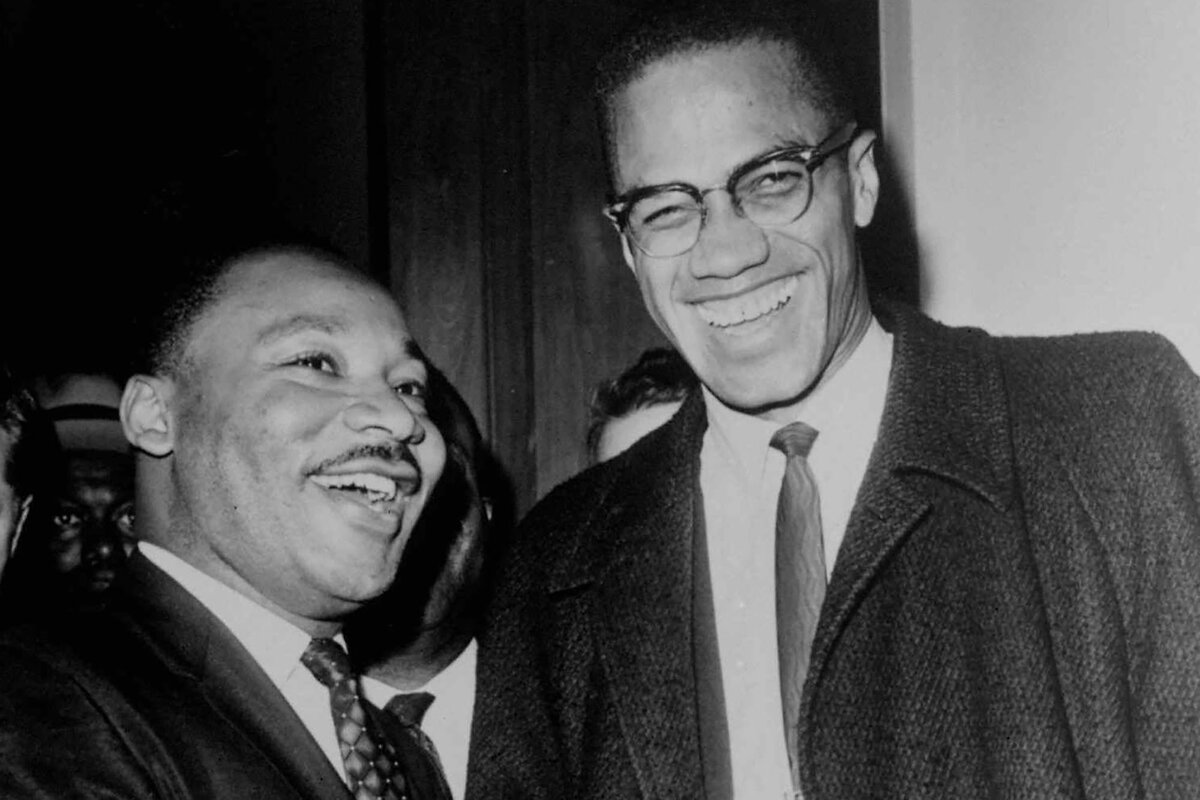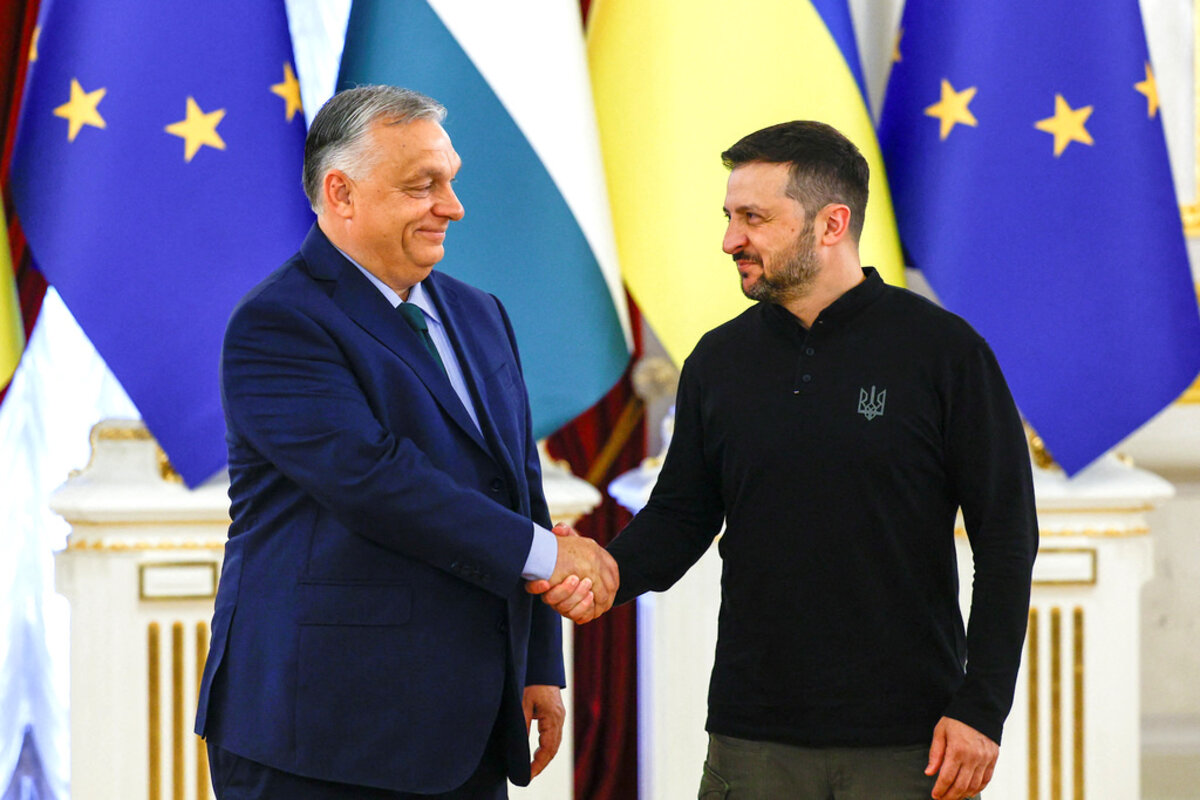Sweeping U.S. Supreme Court rulings that boost Donald Trump, combined with his debate performance being far less scrutinized than Joe Biden’s, have left many Democrats feeling back on their heels.

Why is Christian Science in our name?
Our name is about honesty. The Monitor is owned by The Christian Science Church, and we’ve always been transparent about that.
The Church publishes the Monitor because it sees good journalism as vital to progress in the world. Since 1908, we’ve aimed “to injure no man, but to bless all mankind,” as our founder, Mary Baker Eddy, put it.
Here, you’ll find award-winning journalism not driven by commercial influences – a news organization that takes seriously its mission to uplift the world by seeking solutions and finding reasons for credible hope.
Explore values journalism About usMonitor Daily Podcast
- Follow us:
- Apple Podcasts
- Spotify
- RSS Feed
- Download
 Amelia Newcomb
Amelia Newcomb
One of our stories today looks at how books can help children learn to be resilient and brave. But more broadly, it touches on a favorite topic of mine: why we should read fiction at any age.
Whether aimed at 6-year-olds or at adults, fiction lets us jump into the unfamiliar, be it fun, surprising, or even scary. We see others’ responses and imagine how we might stretch ourselves. Perhaps that’s why retired U.S. Adm. James Stavridis, author of numerous nonfiction books, chose to co-write a novel three years ago. To be sure, it imagined a future global conflict, not being a brave little bear.
But as he noted in an Audible interview, “We need to imagine more in terms of dangers, cautions, and stories. ... Fiction is how we can do that.”
Already a subscriber? Log in
Help fund Monitor journalism for $11/ month
Monitor journalism changes lives because we open that too-small box that most people think they live in. We believe news can and should expand a sense of identity and possibility beyond narrow conventional expectations.
Our work isn't possible without your support.
Today’s stories
And why we wrote them
( 6 min. read )
Today’s news briefs
• New officeholder: José Raúl Mulino has been sworn in as Panama’s next president. He faces pressure to slow migration through the Darién Gap, which more than half a million people traversed last year.
• No opposition: Manhattan prosecutors say they would be open to delaying Donald Trump’s sentencing in his criminal hush money case following a Supreme Court ruling that granted broad immunity protections to former presidents.
• Green light: A U.S. appeals court allowed the White House to move forward with implementing a key part of a new student debt relief plan.
• Evacuation: The Israeli army has ordered a mass evacuation of Palestinians from much of Gaza’s second-largest city, Khan Yunis. The new evacuation zone includes the major aid crossing to southern Gaza.
Commentary
( 4 min. read )
The landmark Civil Rights Act of 1964, which turns 60 on Tuesday, represents a lineage of legislation that protects against discrimination. Whether that legacy endures depends on us, our columnist writes.
( 5 min. read )
Military coups used to be commonplace in Latin America. While that’s no longer the case, regional armies are seeing a renewed prominence as democracies increasingly rely on them for civic functions.
( 6 min. read )
China’s road map for a new, multipolar world order raises questions of fairness, cooperation, and good governance.
( 6 min. read )
Bravery isn’t just for superheroes. That’s the message of four delightful picture books that will inspire, delight, and entertain young readers and their caregivers.
The Monitor's View
( 2 min. read )
On July 1, Viktor Orbán went beyond being merely the president of Hungary with its nearly 10 million people. He took over the rotating presidency of the European Union with its 448 million people. A day later, his moment of greater power led him to take on greater responsibility: Mr. Orbán visited President Volodymyr Zelenskyy in Ukraine.
The trip was a symbol of inclusion, dignity, and respect for Ukrainians. Again and again since the Russian invasion, Mr. Orbán has opposed EU support for the embattled country, often siding with Russian President Vladimir Putin. On July 2, one day into his six-month role as EU leader, Mr. Orbán took his first trip to Ukraine since the war started.
He promised to report to other EU leaders about his talks “so that the necessary European decisions can be taken.” For his part, Mr. Zelenskyy said the visit was “a clear indication of our common European priorities, of how important it is to bring a just peace to Ukraine.”
Mr. Orbán has defied the EU on many issues other than Ukraine, but his assent to the bloc’s presidency helped change his tune. The job requires that a country taking on the role must be an “honest broker” among the 27 member states to facilitate agreements.
The European Council’s website compares the president to “someone hosting a dinner, making sure their guests all gather in harmony – able to express differences during the meal but leaving on good terms and with a common purpose.”
For the next six months, Mr. Orbán will be setting the broad agenda for the EU – but with the need to seek consensus. His stated top priority is to increase the competitiveness of EU businesses.
The EU’s democratic procedures, based on shared principles, have a way of reducing polarization. “This is an extraordinary situation, with a war in the neighbourhood, when we have to provide stability,” János Bóka, Hungary’s European affairs minister, told reporters in June. With his visit to Kyiv, one of Mr. Orbán’s first acts as EU president was to stabilize his country’s ties with a country on track to becoming an EU member.
A Christian Science Perspective
Each weekday, the Monitor includes one clearly labeled religious article offering spiritual insight on contemporary issues, including the news. The publication – in its various forms – is produced for anyone who cares about the progress of the human endeavor around the world and seeks news reported with compassion, intelligence, and an essentially constructive lens. For many, that caring has religious roots. For many, it does not. The Monitor has always embraced both audiences. The Monitor is owned by a church – The First Church of Christ, Scientist, in Boston – whose founder was concerned with both the state of the world and the quality of available news.
( 3 min. read )
During a national election, we can keep in view how God is harmoniously governing our nation and beyond, and expect good results.
Viewfinder

A look ahead
Thanks for joining us today. We have a bonus read about hurricanes. Hurricane Beryl became the earliest storm to develop into a Category 5 in the Atlantic, though it has now been downgraded to a Category 4. Read why scientists are suggesting that maybe there needs to be a Category 6 rating.








